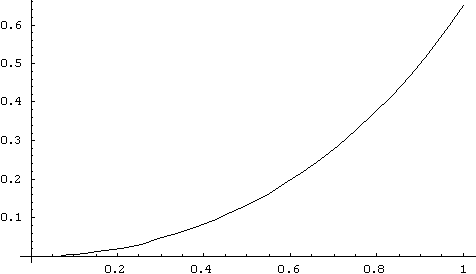
<
Previous
|
Next
|
Contents
>
Whatis ODE?
Ordinary differential equation (ODE) is an equation that involves a rate of change of a dependent variable with respect to
one
independent variable. The rate of change is denoted by one of these equal notations
![]() . Suppose we have a function
. Suppose we have a function
![]() , then variable
, then variable
![]() is called
domain
or
independent
variable and variable
is called
domain
or
independent
variable and variable
![]() is called
range
or
dependent
variable.
is called
range
or
dependent
variable.
Because the rate change is involved only one variable, we call it ordinary derivative. This is in contrast to partial derivatives that involves rate of change of several variables. That is why we have ordinary differential equation (ODE) in contrast to partial differential equation (PDE).
Example:
![]() is an ordinary differential equation with respect to one variable
is an ordinary differential equation with respect to one variable
![]() . The ODE is said to have 3-rd order because the highest order of the rate is 3. It is a first degree ODE because the power of the highest order is 1.
. The ODE is said to have 3-rd order because the highest order of the rate is 3. It is a first degree ODE because the power of the highest order is 1.
The following example illustrates the meaning of solution to differential equation.
Example:
Suppose we have a function
![]() . Differentiate this equation gives an ODE
. Differentiate this equation gives an ODE
![]() . Thus the
general solution
of ODE
. Thus the
general solution
of ODE
![]() is
is
![]() . When we know the value of
. When we know the value of
![]() , we say that the
particular solution
of the ODE is
, we say that the
particular solution
of the ODE is
![]() . Notice that we reverse the strategy from solution to equation.
. Notice that we reverse the strategy from solution to equation.
The general equation of the first order Ordinary Differential Equation (ODE) is given as
![]()
The right hand side is a function
![]() , which usually may involve the independent variable
, which usually may involve the independent variable
![]() , the dependent variable
, the dependent variable
![]() and constants. Sometimes, either variable
and constants. Sometimes, either variable
![]() or
or
![]() are constant and it may simplify the case. In case the dependent variable
are constant and it may simplify the case. In case the dependent variable
![]() is not presence, the right hand side becomes function
is not presence, the right hand side becomes function
![]() and the solution of differential equation can be solved immediately by integration.
and the solution of differential equation can be solved immediately by integration.
![]()
![]()
![]()

Example below illustrates a case when both variable
![]() or
or
![]() are constants such that
are constants such that
![]() .
.
Example:
Suppose we found that population of our region has a constant rate of growth. If we put notation
![]() for the number of population in the region at time
for the number of population in the region at time
![]() (measured in year), we can equate a constant growth rate with equation
(measured in year), we can equate a constant growth rate with equation
![]() . Suppose we know that the growth rate is
. Suppose we know that the growth rate is
![]() and this year population is 1200 people. What is the number of population 10 years from now? To answer that question we need to solve the ODE
and this year population is 1200 people. What is the number of population 10 years from now? To answer that question we need to solve the ODE
![]() , which will give answer
, which will give answer
![]() , inputting
, inputting
![]() gives answer
gives answer
![]()
When the dependent variable
![]() in the right hand side of general ODE equation
in the right hand side of general ODE equation
![]() is not a constant, the integration is not straightforward as above example. It needs differential algebraic equation as shown in the example below.
is not a constant, the integration is not straightforward as above example. It needs differential algebraic equation as shown in the example below.
Example:
Solve
![]() for
for
![]() with initial value
with initial value
![]()
As you may have learn in Calculus, we can write the equation as
![]() . We can separate
. We can separate
![]() and
and
![]() such that
such that
![]() . Integrate both side of the equation
. Integrate both side of the equation
![]() we get
we get
![]() or
or
![]() , or
, or
![]() . We can input initial condition
. We can input initial condition
![]() into
into
![]() we get
we get
![]() . Thus, the solution is
. Thus, the solution is
![]() . We plot for the range of x between 0 and 1
. We plot for the range of x between 0 and 1

<
Previous
|
Next
|
Contents
>
See also: Numerical Excel tutorial , Dynamical System tutorial , Kardi Teknomo's Tutorial
This tutorial is copyrighted .
Preferable reference for this tutorial is
Teknomo, Kardi (2015) Solving Ordinary Differential Equation (ODE). https:\\people.revoledu.com\kardi\tutorial\ODE\
